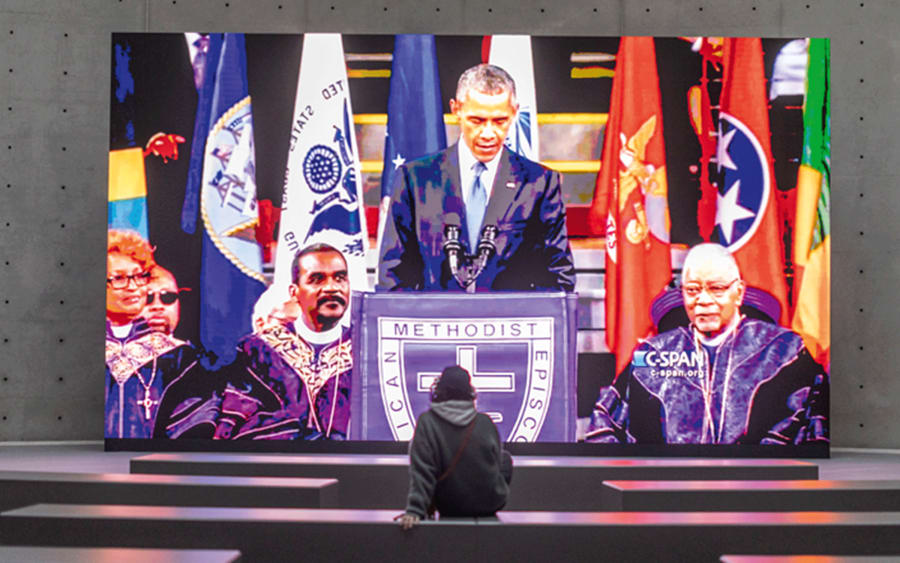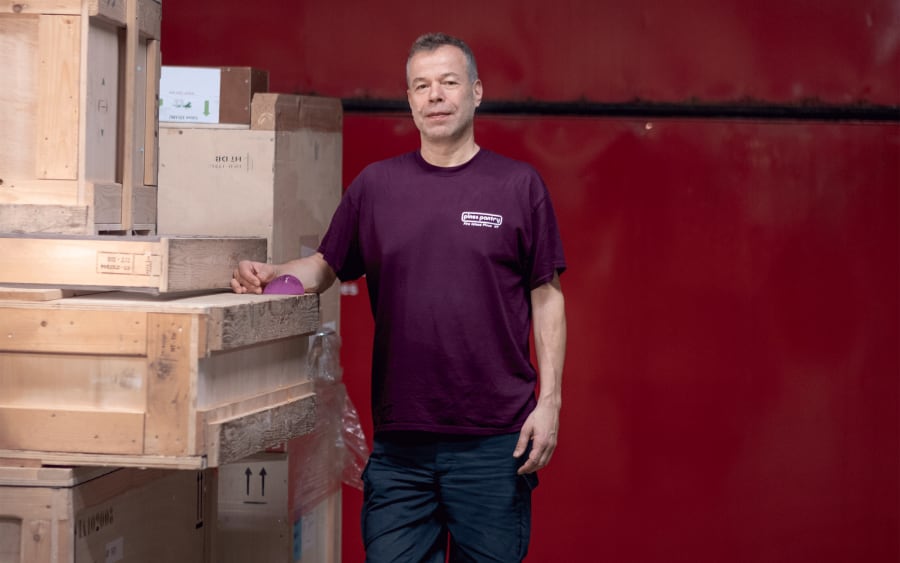Conventional terms fall short of capturing the depth and scope of Christelle Oyiri’s practice. Best known under her DJ moniker Crystallmess, the inaugural recipient of Tate Modern’s newly launched Infinities Commission is at once an alchemist, an archivist, and a hacker. She navigates these roles with an intuitive ease, weaving together different media and methodologies into a singular yet multilayered artistic language. Oyiri works, she says, ‘between the lines,’ not just in terms of form, but also by attending to the porous, unstable spaces between personal history and collective memory, cultural production and political critique.
Born and raised in the Parisian suburbs to Ivorian and Guadeloupean parents, Oyiri’s artistic approach is inseparable from her lived experience. Her practice spans music, performance, writing, sculpture, and film, each medium functioning as a conduit for examining the alienating impact of colonialism and capitalism, and the aesthetics of resistance and contemporary Black subjectivity. These forms are not siloed but intersect, offering multiple points of entry into her expansive oeuvre, which is spectacularly showcased in Tate Modern’s Tanks in London this summer.
The exhibition, entitled ‘In A Perpetual Remix Where Is My Own Song?’ turns explicitly toward the body. Curated by Rosalie Doubal, Tate Modern’s Senior Curator, International Art (Performance and Participation), this new work inaugurates the museum’s latest series of commissions, which Doubal describes as ‘honoring artists who are disrupting the boundaries of artistic forms.’ Awarded to Oyiri in summer 2024 by a jury of leading voices in the field including composer Brian Eno, artist Anne Imhof, and Legacy Russell, Executive Director and Chief Curator of The Kitchen, New York, her new body of work takes the form of a large-scale audiovisual installation that engulfs the Tanks’ unique architecture. As Doubal notes, it marks ‘an exciting step-change for the artist – offering a symbiosis between her visual practice and her work as a DJ.’
Bronze sculptures of a woman’s naked body in various states of transformation, mounted on plinths that double as speakers, are animated by light and warping sound. The body becomes both source and site, at once objectified and reclaimed, deformed and empowered. This mutable form acts as a lens through which Oyiri interrogates ideals of beauty, cosmetic modification, and representations of femininity. The installation’s integrated choreography of light, sound, and sculptural elements converges into a film projection that implicates the viewer in its unfolding logic.
Oyiri’s practice has always centered itself on the audience – first emerging from the Parisian club scene of the 2010s. Over the past decade, she has cemented her place as a key voice in the international electronic music scene, releasing work on labels such as PAN, self-producing her EP Mere Noises (2018), and performing at globally renowned venues like Berghain, Berlin, and festivals including Coachella, where she appeared alongside Frank Ocean.
Oyiri’s use of music goes far beyond the club, informing a wider artistic practice she has developed in recent years – one that has swiftly positioned her as a leading artistic force of her generation. In her work, sound becomes a carrier of political charge, embedded with affective memory and collective identity. Her work is deeply informed by the writings of decolonial writers past and present, including Aimé Césaire, Édouard Glissant, and Kodwo Eshun. Her musical interventions, whether in live performances or installations, operate as strategies of disruption that challenge linear and Eurocentric genealogies of musical history and the continued violent effects of colonialism.
She carries this critical thinking into her writing, with texts published in The Guardian, Dazed, and other platforms, in which she expands on the often forgotten history of African Diasporic music cultures, particularly the Ivorian genre of logobi, which rose to prominence in the war-torn Ivory Coast in the 2000s, and emerged in the late 2000s to late 2010s as a popular genre among Black youth in France. Oyiri’s reading of logobi is personal – rooted in her own biography – yet politically charged, as she traces the genre’s origins while highlighting its role in shaping Diasporic subjectivities within structures of systemic marginalization.
This celebration of logobi also underpins her seminal film Collective Amnesia: In Memory of Logobi (2018-2022), formed of a hybrid collage of 3D-animation, found footage, and scripted scenes. The film tells the story of a girl who has lost her memory and rediscovers her past through art, music, sorcery, and friendship. As with much of Oyiri’s work, the narrative unfolds in a liminal zone, between dream and document, archive and fiction. It is a film about transmission, rupture, and the fragile architecture of memory.
The film featured in her first institutional solo exhibition, ‘Gentle Battle’, at Tramway, Glasgow, in 2022 which explored her interest in building complex speculative narratives anchored in specific cultural histories. A central work in the exhibition, the film War! Club! Action! (2022), repositions the emergence of coupé-décalé, a genre closely linked to logobi. Through the figure of Douk Saga, a musician credited with its popularization, the film explores how music can act as a tool for resilience.
2002 (2022) was also presented in the exhibition – a large-scale wooden folding screen with a montage of manipulated family images, forming a spectral portrait of both kinship and fracture. Elsewhere, Vindicta (2022) reflected on the looting of African artifacts during colonization. Here, etched mirrored panels bear the image of masks from the Kru ethnic group, indigenous to Ivory Coast and Liberia. The viewer’s reflection merges with the ghostly faces of stolen heritage, implicating them within a colonial continuum and collapsing the distance between subject and object, viewer and viewed.
Oyiri’s critique of colonialism extends beyond historical restitution to environmental violence. For ‘Venom Voyage’, presented at ETH Zurich in 2023, she recreated a fictional travel agency as an installation, critiquing France’s systemic use of exploitation as an instrument of colonialism. The seductive images of Guadeloupe and Martinique as tourist destinations are set against the devastating legacy of pesticide use, specifically chlordecone, a carcinogenic chemical banned elsewhere but used for decades in France’s overseas territories.
In 2024, after being awarded the prestigious PONTOPREIS MMK, Oyiri presented the exhibition ‘AN EYE FOR AN “I”’ at MMK, Frankfurt, Germany. Through a new film and installation, she returned to the Parisian suburbs of her youth and focused on the figure of the chouf, an Arabic term that denotes individuals who keep watch on housing estates, alerting drug dealers to police presence. Oyiri repositions the chouf as an agent of counter-surveillance and resistance, an active node within a network of informal, protective infrastructures that materialize in response to stately oppression. Sound, light, and architectural interventions converge to produce a dense, immersive environment of observation and concealment.
As with her Tate commission, in all these works the personal is never merely introspective. Her work insists on the viewer’s presence and responsibility. The immersive, often confrontational environments she builds demand that we reflect not only on what we are experiencing, but on how we understand our place within these shared histories. Whether through music, film, or sculpture, Oyiri creates spaces of confrontation and communion, sites where the past and future collide in embodied acts of witnessing and resistance.
Juliette Desorgues is a curator and author. She lives and works in Paris and London.
Caption for header image: Installation view: ‘In A Perpetual Remix Where Is My Own Song?’ by Christelle Oyiri, Tate Modern, 2025. © Tate Photography - Joe Humphreys.
Published on June 24, 2025.


